Just like their owners, many dogs struggle to keep their weight down and stay in tip-top shape.
Weight loss is generally viewed positively by owners and vets. In fact, most owners find themselves seeking out low-calorie dog foods to promote weight loss when their older dogs start packing on extra pounds.
However, some owners have the opposite problem, struggling to have their dog keep weight on. There are some occasions in which weight loss can indicate a problem – particularly when it occurs in older dogs.
Most geriatric animals lose a little muscle mass as they age (your grandma probably can’t bench press as much as she used to), so a bit of weight loss is not necessarily unusual or cause for concern. Except when it is. The trick is to determine when your older dog’s weight loss is normal and when it indicates a health problem.
Below, we’ll discuss some of the reasons older dogs suffer from weight loss and explain some of the most common signs and symptoms that should have you making an appointment with your vet.
Weight Loss in Older Dogs: Key Takeaways
- Unfortunately, many dogs begin to lose weight as they age. In some cases, this is normal and no cause for serious concern — particularly if the weight loss occurs over a long period of time. But in other cases, such as when the weight loss occurs rapidly, you’ll want to seek prompt veterinary care.
- There are a variety of health problems that can make an aging dog lose weight. Some of the most common ailments associated with weight loss include dental problems, canine cognitive dysfunction, and kidney disease. However things like cancer can also cause weight loss in some cases.
- There are several ways to help your dog bulk up, but you’ll need to work with your vet to do so. Ultimately, the most important thing is to treat any underlying illnesses causing the weight loss, but you may also want to employ some husbandry or management solutions, such as simply moistening your dog’s food to make it easier to chew.
Symptoms and Illnesses that Can Cause Weight Loss in Older Dogs
There are a variety of different issues that can cause your senior canine to lose weight. Accordingly, it is important to visit your vet anytime your dog loses a significant amount of weight – usually defined as 10% of their normal body mass. Only a veterinarian can determine the cause behind your dog’s weight loss, and provide you with an accurate prognosis.
Weight loss is most troubling when it occurs over a short period of time. If your 60-pound-husky loses 6 pounds over a 6-month period, it probably doesn’t represent a serious problem. But if your dog loses this much weight in a month or so, you’ll need to take the weight loss more seriously.
Some of the most common causes of weight loss in elderly pups include:
- Dental Problems – Failing teeth, gum disease, and other dental problems are common in older dogs. These types of problems can discourage your dog from eating and lead to weight loss. Your vet can help treat most oral health problems (although you should do your part to treat such problems proactively), which may help make it easier for your dog to eat again.
- Anxiety, Depression, and Canine Cognitive Dysfunction – Just like people, dogs suffering from emotional disorders, such as anxiety, depression, or canine cognitive dysfunction may stop eating as much as they normally would.
- Kidney Disease – Kidney disease is a pretty common problem for older dogs, and among other symptoms, it can cause your pup to drop a few pounds. Talk to your vet about performing a simple kidney function test and switching to a dog food for kidney disease, which will be formulated with unique properties to keep your dog healthy.
- Cancer – There are a variety of different cancers that can afflict dogs, and their symptoms vary widely from one type to the next. Many cancers produce visible lumps or sores, but plenty of others don’t, which further illustrates the need to visit the vet when your dog loses weight quickly.
- Heart Disease – Heart disease is a fairly common problem for older dogs, but it can usually be treated medically. Heart disease often causes a chronic cough, as well as lethargy and excessive sleepiness, so be especially vigilant about observing your dog’s behavior as he ages.
- Intestinal Disease – Dogs with poorly functioning intestines are unable to digest and absorb their food properly. This can lead to weight loss, even if your dog still exhibits a normal appetite.
- Liver Disease – Liver (and to a lesser extent, gall bladder) disease can occasionally cause sudden weight loss. Keep an eye out for yellowing eyes or skin, as these can indicate jaundice – another symptom commonly associated with liver disease.
- Dehydration – Your dog would need to be pretty dehydrated to lose 10% of his body weight, but it is possible. In principle, this is a pretty easy problem to treat, but it can be challenging to coax some dogs into drinking more. You may find it helpful to offer your pooch a few ice cubes, as dogs often like to chew them. Pedialyte is another way to help dogs rehydrate quickly.
- Diabetes – Diabetic dogs are unable to use glucose to fuel their body like healthy, non-diabetic dogs do. Instead, their body must turn to other energy sources, such as the protein and fat in their bodies. This can lead to a net loss in weight for your dog. Diabetic dogs often need a special food, specifically formulated to meet their nutritional needs.
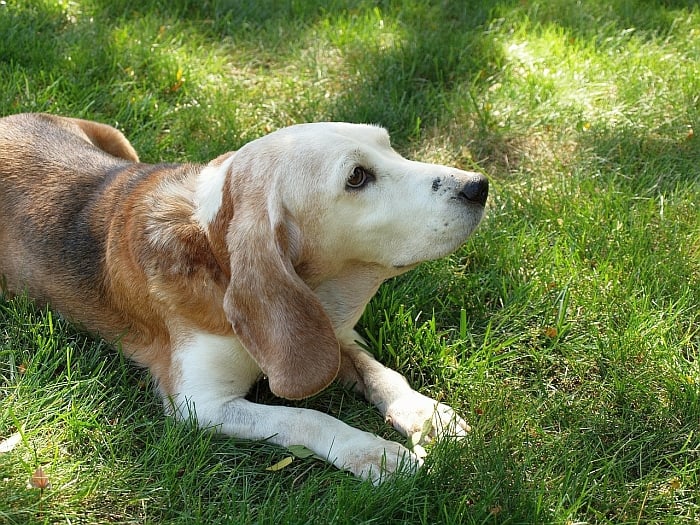
Packing the Pounds on Your Senior Dog
You’ll always want to work closely with your veterinarian any time you make substantial changes to his care regimen or diet, and if your vet identifies a specific medical problem, you’ll obviously want to provide the suggested treatment — particularly if your dog’s ailment is causing him pain.
But some of the best ways to help elderly, but healthy, dogs regain a bit of weight include the following:
- Switch to a diet or dog feeding schedule that provides more calories. You may want to look at a food formulated for “all life stages,” as these foods often provide more calories and protein per cup than those formulated exclusively for senior dogs or adults. If your dog still exhibits a strong appetite, you may simply find it easier to provide a little more food than normal.
- Provide your dog with moist or wet food. If your dog isn’t eating well because of dental issues, you may be able to entice him to eat more by moistening his food or switching to a wet variety. Just be sure to speak about any dietary switches with your vet.
- Reduce the amount of exercise your dog gets. Exercise is very important for good health, but you may need to trim your dog’s exercise just a bit to help him regain his original weight.
- Consider supplementing your dog’s diet with a probiotic. Probiotics – beneficial bacteria that live in your dog’s digestive tract – are sometimes helpful at improving the intestinal function of dogs. Some dog foods are fortified with probiotics, but you can also add powdered probiotic supplements to your dog’s normal food.
- Add a tasty topper to your dog’s regular food. Sprinkling a little shredded cheese or stirring in a teaspoon or two of olive oil can help increase the caloric value of your dog’s food and improve its palatability, which may encourage your dog to eat more enthusiastically.
- Make sure you are supporting your dog’s mental and emotional health. If your dog’s weight loss is the result of anxiety, depression or another mental ailment, you’ll need to take steps to help him feel a little better. You may be able to accomplish this by simply spending a little more time with him, but if that doesn’t improve his mood, a consultation with an animal behavior therapist may be necessary.
For more reading, make sure to check out our guide on how to fatten up a skinny dog. Suggestions there apply to all dogs, rather than specifically senior canines, but you may still find some helpful strategies to keep Fido’s weight up.
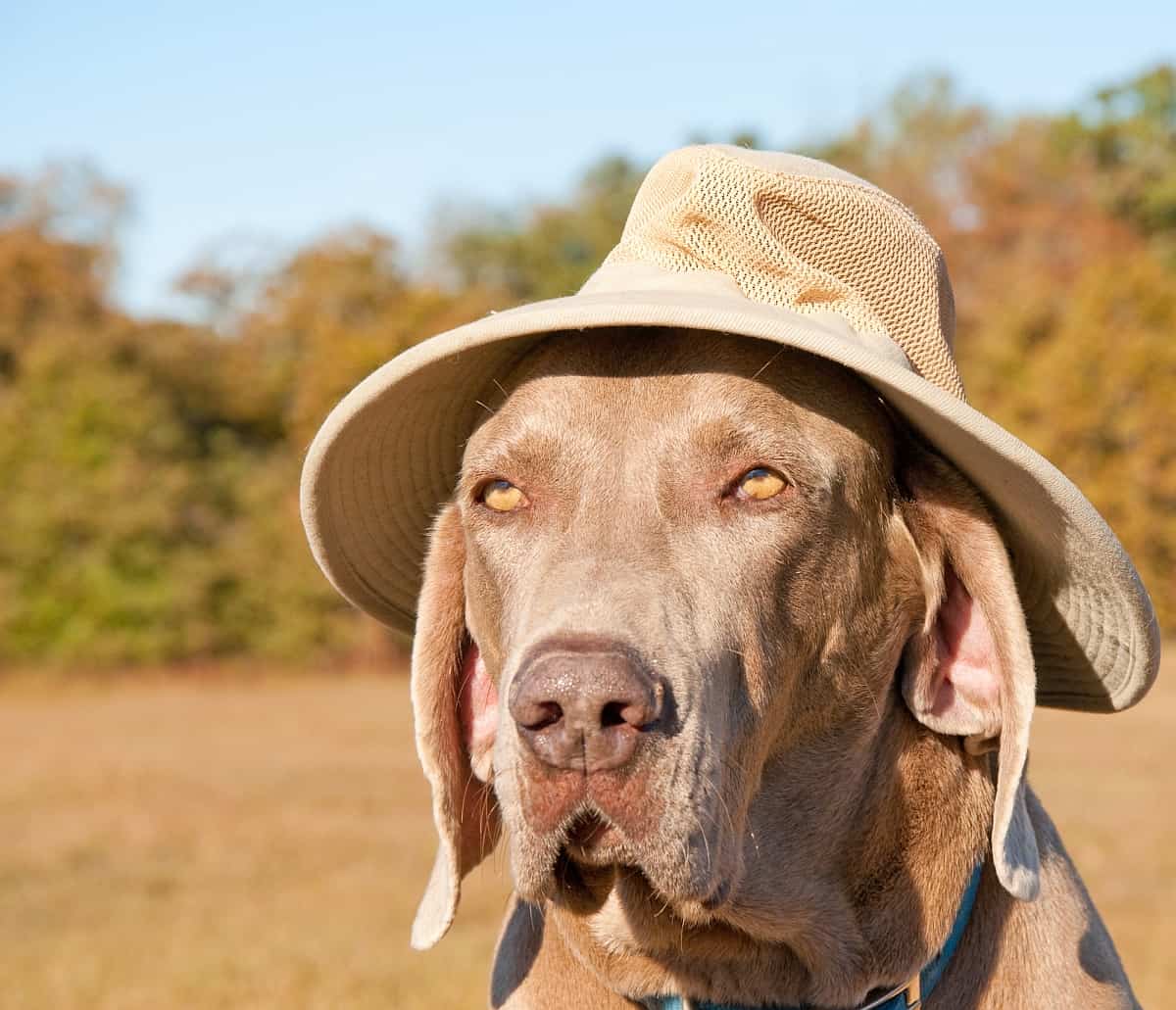
Has your elderly pooch ever struggled to maintain a healthy body weight? Was your vet able to determine a cause? What steps did you take to help fatten her up?
Tell us all about your experiences in the comments below.
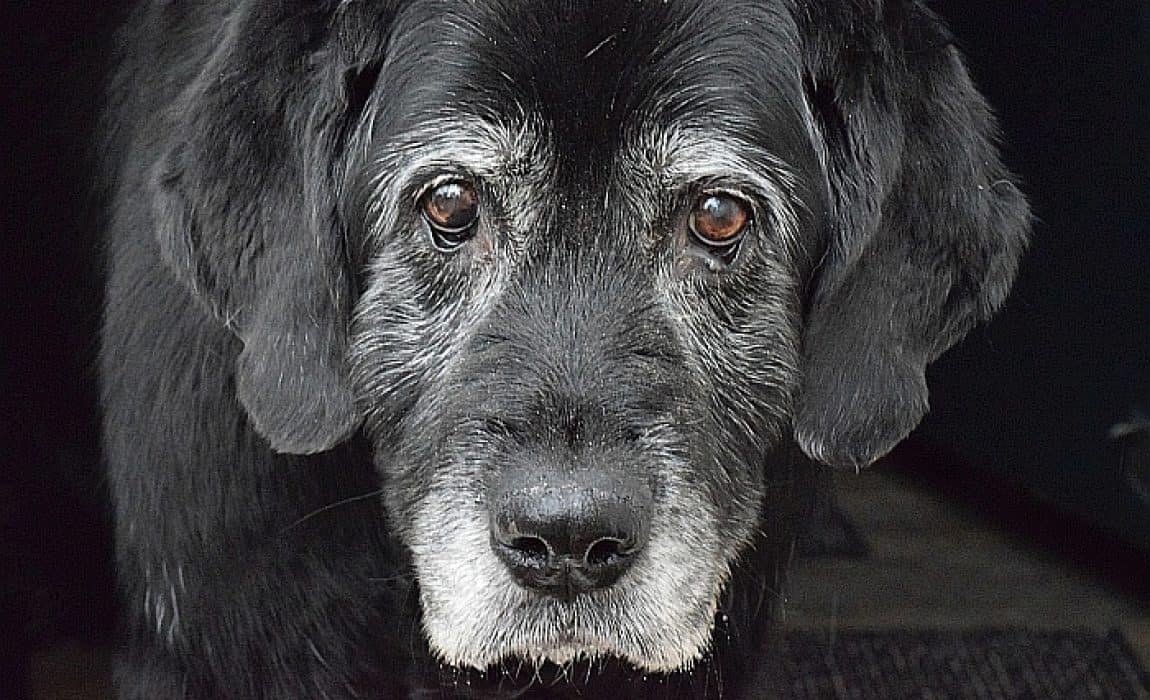

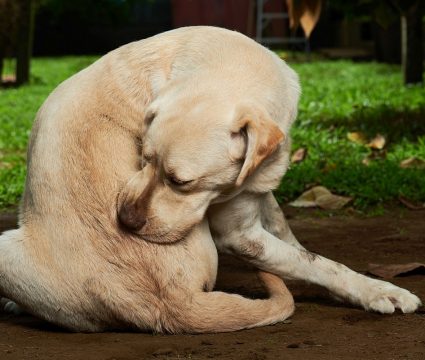
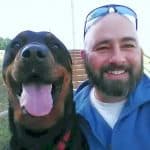


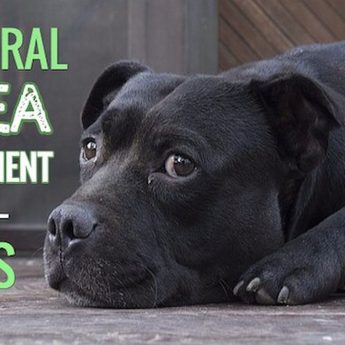
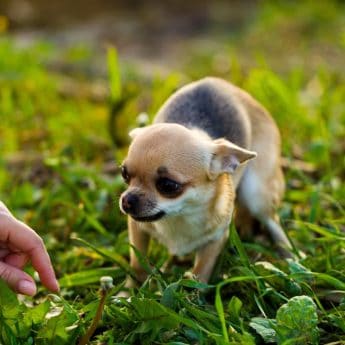

1 Comment
October 1, 2019
Our dog is a terrier that was adopted as a 4 yo chi. He gained 2lbs quickly and tapered at 10lbs for the past 7 yrs. He’s about 11 years old now.
Our vet considers him a chi and has urged us to avoid his favorite snack, baby carrots. Despite his toned physique, she says he’s overweight at 10lbs.
My friends/family have recently noted that our dog looks slimmer, but gosh he eats an unseasoned version of almost everything we eat (ok, sometimes tortillas and pizza crust).
He had a tiny stick in his mouth due to receding gums and had 19 of 42 teeth pulled about 2 months ago. Dog has better maintained teeth than me and I’ve spent way more on his teeth than my own. The vet happily stated that he’s down to 8lbs now.
His nails are turning a lighter color than usual, spotted with irritation from licking, and he’s not putting on weight no matter how much he eats. I’m thinking the irritated paws may be related to antibiotics and/or seasonal allergies. I’m hoping his weight will go up or at least stay at 8lbs now that his teeth don’t hurt.
Do these combined symptoms sound familiar to anyone? I’m a bit worried about his weight loss combined with foot problems. My vet doesn’t seem concerned and I’m not pushing because my (very modest, but a lot for me) care credit bill for his teeth has my cash strapped.